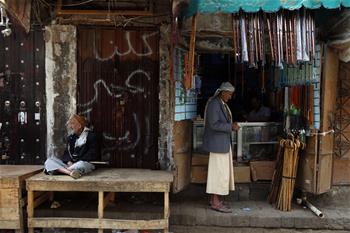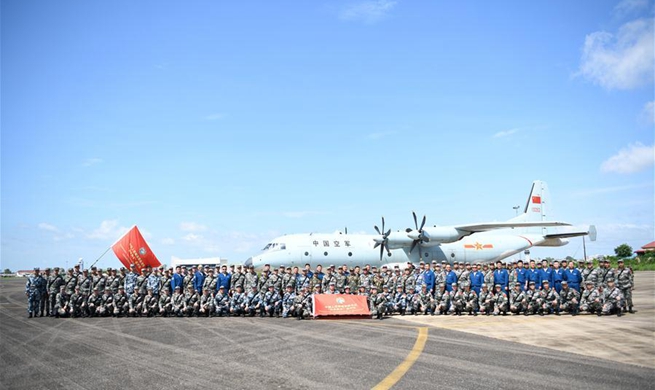TIANJIN, Aug. 17 (Xinhua) -- Hu Jinyan, 58, used her smartphone to watch real-time videos of chickens' living conditions and their surroundings through a visualization system installed in her chicken breeding base.
As the general manager of the base in north China's Tianjin Municipality, Hu has made good use of high-tech to expand her chicken-raising business.
With the product tracking system, customers can log into their WeChat accounts, the largest social networking platform in China, to get full information of the chickens and eggs, according to Hu. In addition, she can also use these "eyes" to better raise the chickens, she added.
Now, more than 50,000 chickens with white bellies, black tails and red cockscombs live on the 200 hectares of the base, nesting in about 30 chicken sheds built on the top of mountains in the area.
"Our chickens run freely in the mountain. They eat worms, potherbs and wild fruits during the day, and we feed them mixed corns and bran without any additives at night," Hu said.
Hu, who retired as a teacher from a local middle school, believes that food safety is crucial for children's health. Since chickens and eggs are closely linked with people's daily life, Hu determined to raise chicken in the mountain to provide healthy foods for the children.
She looked up various resources online and visited many chicken breeding bases in different regions. In 2011, Hu decided to introduce a special breed of 5,000 baby chicks from southeast China's Zhejiang Province.
"These lively chickens are good at running and flying compared with others and have a greater resistance to diseases. More importantly, the mountain land is a wonderful place to raise them," she said.
In the beginning, the base's lack of infrastructure brought Hu many problems. "When it rained, the wheels of egg-carrying carts got stuck into the mud. It was hard to transport the eggs," Hu said.
With the support of the local government, roads were built along the mountainside, and the problems of water and electricity supply were fixed.
Hu also has close contacts with agricultural experts to get more professional advice. Zang Sumin, a professor at Hebei Agriculture University, is among them.
"Hu was not professional at first; she always chose big-sized chickens with beautiful feathers. She didn't know that some small-sized chickens tended to have better abilities to lay eggs," said Zang, who provided piles of suggestions on breeding, epidemic prevention, environmental monitoring and management for Hu's base.
In addition, Hu put electronic bracelets on the feet of each chicken to monitor their laying rate and death rate. With the scientific breeding approaches, the laying rate of chickens rose from 30 to 60 percent.
Hu registered the trademark for her base in 2012 and established a complete industry chain, including chicken hatching, breeding and selling. In 2018, the total sales volume reached about 11 million yuan (1.56 million U.S. dollars), half of which were sold online.
Benefitting from scientific raising methods and advanced technology, Hu helped other villagers get rich and offered technical guidance for free.
Wang Zhenxing, 33, a local Tianjin villager, bought 1,000 chickens from Hu this February after watching a TV program about her chicken breeding base.
"Organic food is in high demand in the market and incorporating high-tech into raising chickens is promising," Wang said, adding that Hu has provided support to him and 96 percent of his chickens are healthy. He said he would buy more from Hu next year.
Hu's success has also attracted villagers from many other provinces in China, like nearby Hebei, east Shandong and Jiangsu provinces, to learn the secret of her success.
"In the future, I plan to develop part of the breeding base as an ecological tour, combining poultry farming with tourism. My ultimate goal is to increase the value of this region's clear waters and green mountains," Hu said.

















